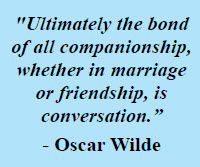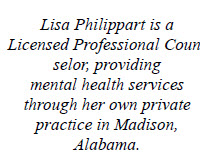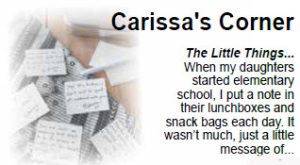 By: Lisa Philippart
By: Lisa Philippart
As we noted in my last article, difficult conversations are an unavoidable part of life. In this article, we will continue to look at some suggestions for making these uncomfortable conversations more pleasant and productive. Suppose you are having conflict with a coworker about her tendency to be late and flaky on shared projects, which leads you to have more unnecessary work. During the conversation, be very careful to avoid saying things that criticize your coworker’s character, like, “She is always late and never sticks with her commitments.” Instead focus on the specific behaviors that are problematic: “Last week, it took her three days after the deadline to get her material to me.” When you make generalizations about people’s character or personality as a whole, it feels like an attack…which leads them to get defensive and you to get even more frustrated and upset. Comment on the action, not the person.
Everyone gets defensive sometimes, and it’s especially common in challenging conversations. Unfortunately, most people’s reaction to feeling defensive is to start acting defensive, which only intensifies the difficult emotions, making it harder to stay calm. One of the best ways to deal with defensiveness (either yours or theirs) is to proactively anticipate it. If you need to deliver some negative feedback, you might spend ten minutes ahead of time imagining what topics in particular will lead them to feel defensive. Preparation is key. Specifically, it will help you to be mindful in the moment…to acknowledge and validate the feelings of defensiveness, so that you don’t end up acting defensive.
 I think one of the biggest reasons why it’s hard to stay calm in difficult conversations is that we become reactive…reacting to difficult emotions because we want to avoid them. For example, you may start angrily criticizing to keep the focus off your own insecurities and fears. Or you become overly accommodating because you feel nervous about upsetting the other person. In order to avoid being emotionally reactive, it may help to be mindful of your personal values. For example, if you take a few minutes before that uncomfortable conversation to reflect on your value of courage and why it’s important to you, you’ll be much more likely to move toward your goal of communicating your wants and needs clearly, rather than getting lost in reactions to your fears and insecurities.
I think one of the biggest reasons why it’s hard to stay calm in difficult conversations is that we become reactive…reacting to difficult emotions because we want to avoid them. For example, you may start angrily criticizing to keep the focus off your own insecurities and fears. Or you become overly accommodating because you feel nervous about upsetting the other person. In order to avoid being emotionally reactive, it may help to be mindful of your personal values. For example, if you take a few minutes before that uncomfortable conversation to reflect on your value of courage and why it’s important to you, you’ll be much more likely to move toward your goal of communicating your wants and needs clearly, rather than getting lost in reactions to your fears and insecurities.
A lot of emotional swings that happen during difficult conversations are the result of (unreasonable) expectations being violated, which leads to unnecessarily high levels of surprise, anger, disappointment, and the like. For example: Let’s say you go into a conversation with your boss expecting that you’ll get a raise, but instead, she tells you that you won’t be getting that raise because the company is struggling financially. That’s disappointing for sure, but the story you’ve been telling yourself and what actually happened may cause you to experience a lot of anger and frustration, on top of the disappointment. Suppose ahead of time you had asked yourself: “What expectations do I have for this conversation?” This could be followed by, “Are there any good reasons to think that a raise might not happen?” If you seriously reflected on those questions, you would be much more prepared to handle the unfortunate news of not getting a raise in a calmer, more balanced way.
 And finally, difficult conversations often end up as battles, with each person trying to “win” the conversation. If you are thinking and acting as if a conversation is a competition, your emotions are going to run hot. If you can approach the conversation as a shared journey, you’re much more likely to keep your cool and stay calm. And a great way to do this is to acknowledge mistakes. When you acknowledge that somehow you’ve made a mistake, it’s incredibly disarming. Your counterpart won’t feel judged or attacked, which means they are less likely to escalate themselves. An example statement might be: “I could have handled that better.” In fact, acknowledging mistakes can often lead the way to fostering vulnerability and trust.
And finally, difficult conversations often end up as battles, with each person trying to “win” the conversation. If you are thinking and acting as if a conversation is a competition, your emotions are going to run hot. If you can approach the conversation as a shared journey, you’re much more likely to keep your cool and stay calm. And a great way to do this is to acknowledge mistakes. When you acknowledge that somehow you’ve made a mistake, it’s incredibly disarming. Your counterpart won’t feel judged or attacked, which means they are less likely to escalate themselves. An example statement might be: “I could have handled that better.” In fact, acknowledging mistakes can often lead the way to fostering vulnerability and trust.
By: Lisa Philippart
Licensed Professional Counselor







